Follow These 8 Do's And Dont's To Recover Fast After A Kidney Transplant
Just like any other surgery, kidney transplant too requires intensive care and a defined dietary modification to speed up the recovery process. Anti-rejection medicines (immunosuppressants) that are given to prevent rejection of the new kidney by the body may suppress your natural immune system and put you at a risk of catching infections easily. Also, the possible side-effects of these medications increase your nutrient requirements. So, your dietary requirements no more remains similar to all those who have not undergone this procedure.
To help you deal with the unknown complications of the post kidney transplant here are 8 easy-to-incorporate dietary 'dos & don’ts' rule, which are planned in accordance to your body’s modified needs and tolerance levels. Read on.
What you eat matters?
Follow these 8 Do's and Dont's to recover fast after your kidney transplant:
DO:
1. Add protein to your plate
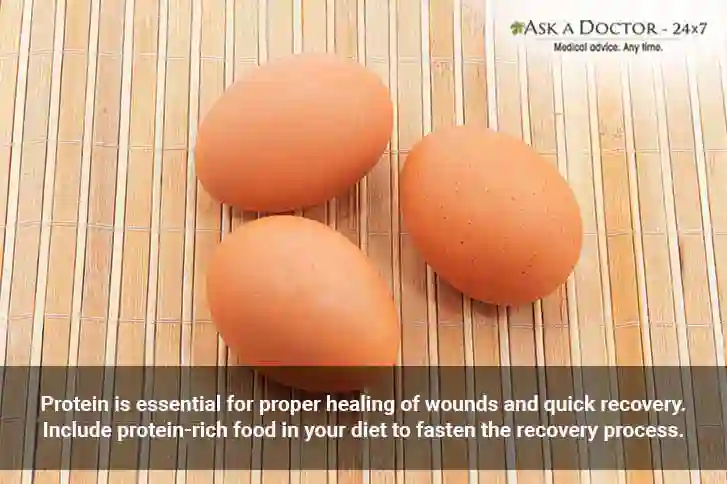
Protein is essential for proper healing of wounds and building of muscles and tissues. This is the reason the protein requirement of the body immediately after the transplant gets higher. It is advisable to include more of protein-rich food such as eggs, chicken, low-fat milk, cottage cheese, yogurt, broccoli, guava, oats, and nuts like almonds, etc in your diet as it helps in quick recovery.
2. Consume food high in fiber and low in fat content
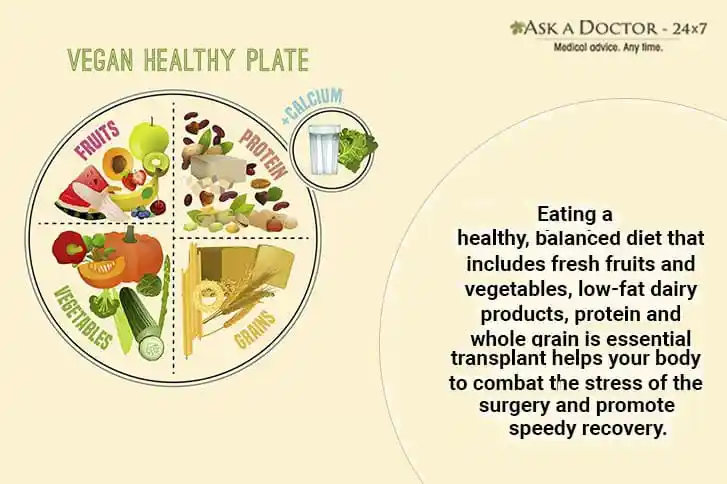
Control your calorie intake, instead consume more of high-fiber and low-carb foods such as leafy greens, avocados, chia seeds, flax seeds, etc. Indulge in some physical activity, and try to stay active for at least 20 min to 30 mins days to avoid excessive weight gain and keep your heart healthy. You may talk to your dietitian regarding this.
3. Lower your salt intake
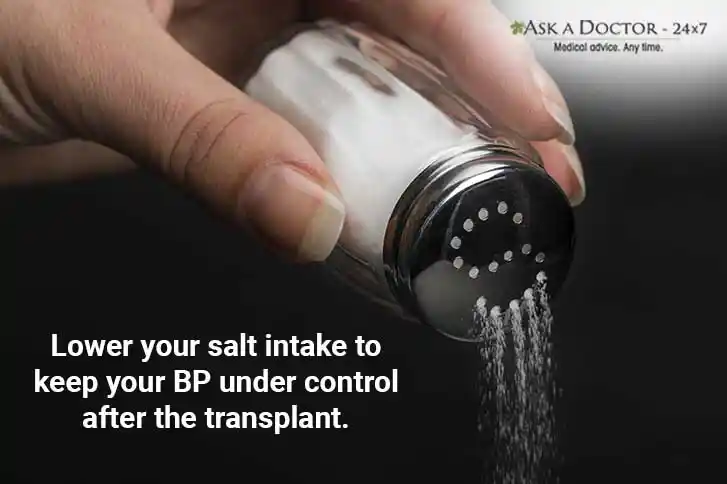
Your transplant medicines, especially steroids, may cause your body to retain fluids. Salt may worsen this problem, as a result of which your blood pressure (BP) may rise. So, it’s always advisable to lower your salt intake to keep your BP under control.
DON’T:
4. Catch infections

Your anti-rejection medicines not only help keep your body from rejecting your new kidney but these also lower your natural immune levels. This makes you more prone to infections. So, it is advisable to stay away from ill people and avoid visiting public places for some time, as chances of catching infections are high in such places. Also, make sure to practice basic good hygiene.
5. Eat raw or under-cooked food
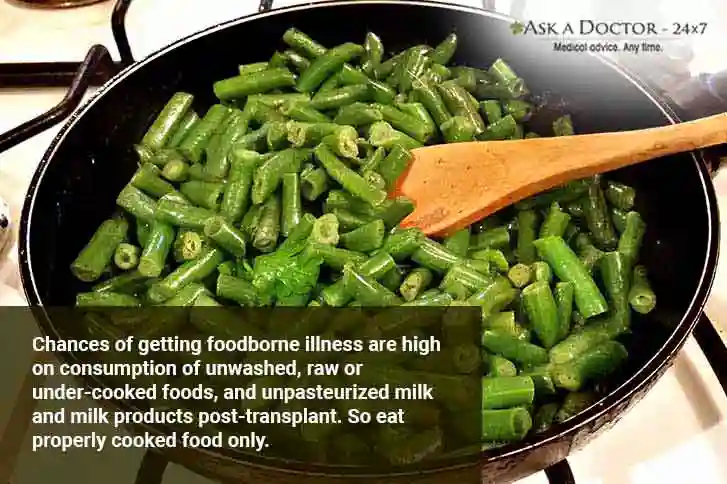
Avoid eating unwashed fruits, processed and under-cooked meat, poultry, and vegetables as you are more likely to catch food-borne diseases from them.
6. Munch grapefruit, pomegranate, and their juices
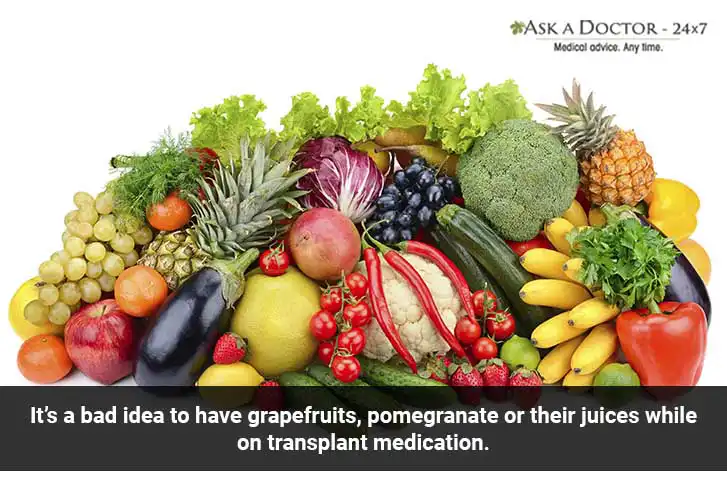
Your transplant medicines are likely to react with grapefruit, and pomegranate, as well as their juices. So, it makes eminent sense to avoid consuming such fruits and their juices as long as you are on these medications.
7. Consume alcohol

Take a break from booze and remain alcohol-free for most of the days in a week if you have undergone a kidney transplant.
8. Pop any pill without consulting your doctor
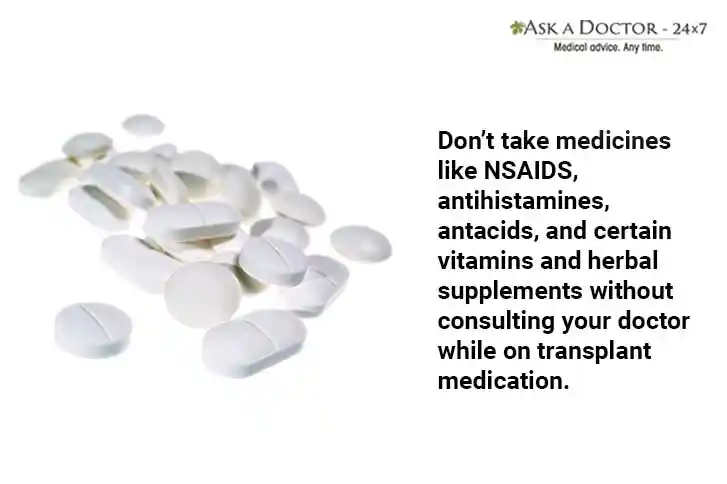
Always consult your doctor before taking any medication, as some medicines such as NSAIDS (pain killers), antihistamines (medicines for treating allergies), antacids (medicines that relieve heartburn and indigestion), and certain vitamins and herbal supplements may alter your kidney functions or have potential to interact with your transplant medicines. So, taking these, along with your current medication, may be risky.
Keep this in mind very clear that any kind of negligence in terms of food intake, medications, and overall care can adversely affect your kidney functions and put you at risk of developing complications. So it is always advisable to stay attentive and practice precaution. The above suggested tips will certainly help you to live well post your transplant procedure. But before bring them in practice make sure to consult your doctor as s/he may make modification in the given list suiting to your specific health condition.
Ask a Specialist
Recent Questions


